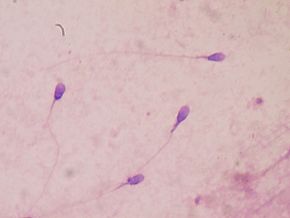
Currently there is incredible concern over what the group of toxic chemicals called PFAS (per- and polyfluoroalkyl substances) are doing to humans. PFAS are commonly known as "forever chemicals" because of their persistence in our bodies and environment. They are all around us (e.g., in personal care products, cosmetics, food packaging, nonstick cookware, textiles, carpets), and as a consequence almost all of us have them in our bodies.
Why be concerned over PFAS chemicals? They are endocrine (hormone) disruptors and have numerous harmful health effects, including all sorts of reproductive effects (e.g., decreases in sperm numbers, increased rates of infertility), decreases in testosterone, increased risk of cancer, and immune effects. Studies also find that they cross the placenta and accumulate in the fetus.
Now another worrisome large study (864 young men, 18.9 to 21.2 years old) has been published. Danish researchers found that those men who had been exposed to higher levels of PFAS during pregnancy had lower levels of sperm (both sperm concentration and sperm count), and a higher proportion of not swimming correctly and nonmoving sperm in the adult sons. This means that prenatal exposure has an effect on both quantity and quality of sperm in adulthood.
The PFAS levels were first measured during pregnancy (in the mother's plasma) during the first trimester, when the male reproductive system is developing. Sperm counts have been dropping rapidly in the past 40 years throughout the developed world, and these chemicals may be one of the reasons.
Bottom line: We can't totally avoid these chemicals, but the good news is that we can lower by a lot how much we are exposed to. And your levels can go down within weeks.
PFAS are commonly used because they have water, dirt, stain, and oil repellent properties. For example, they are used in water-resistant and long-lasting cosmetics, and in rugs and upholstery with added stain-resistance. This means that there are many simple ways to lower your exposure, mainly by some lifestyle changes (e.g., by using regular stainless steel pots and not non-stick pots).
A good list of ways to lower your exposure to PFAS and other harmful chemicals, especially if you are pregnant or thinking of pregnancy, or have children. Can also go to ewg.org for lists of personal care products that are PFAS and toxin free.
Nice, short article from The Guardian: Study links in utero ‘forever chemical’ exposure to low sperm count and mobility
A new peer-reviewed Danish study finds that a mother’s exposure to toxic PFAS “forever chemicals” during early pregnancy can lead to lower sperm count and quality later in her child’s life. ...continue reading "Study Finds “Forever Chemical” Exposure Early in Life Has Effects On Sperm In Adulthood"
